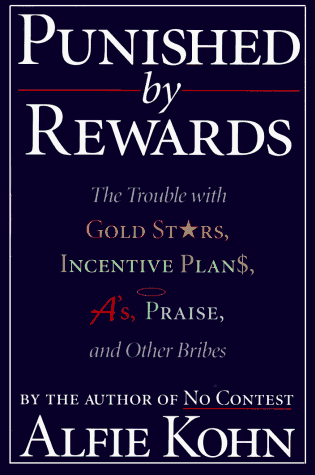Japh Abrasado's Key Ideas from Punished by Rewards
by Alfie Kohn
Ideas, facts & insights covering these topics:
9 ideas
·1.53K reads
11
Explore the World's Best Ideas
Join today and uncover 100+ curated journeys from 50+ topics. Unlock access to our mobile app with extensive features.
Why you should be careful in giving rewards.
“If unconditional love and genuine enthusiasm are present, praise isn't necessary. If they're absent, praise won't help.”
23
296 reads
Rewards may have negative impacts if you're not careful.
Let us begin with a real-life example. In order to make George develop a good reading habit, his mother set up an incentive plan for him: he would receive two dollars every time he successfully finished a book. At first, George was very enthusiastic and devoted to reading. But after a while, George gradually lost his interest and patience. Until one day, George took out four dollars and gave them to his mother: “You can have these four dollars. I don't want to read for these two days.” Since then, no matter what, George wouldn't touch those books. His mother’s incentive plan ultimately failed
25
201 reads
5 Reasons Why Rewards Ultimately Fail
We have all tried rewards in life in order to improve people’s productivity or have been ourselves rewarded like this. But things usually do not work out that way: rewards only have a temporary effect and ultimately fail. What reason leads to the ultimate failure of rewards? Next, we will analyze for you the five reasons behind the failure of reward-based approaches.
26
187 reads
#1. They impede adventurism and creativity.
Psychologist points out: rewards are the enemy of exploration. When people have rewards in front of them, they will not venture to take on more meaningful challenges because they feel safe in receiving rewards. They tend to do things that are likely to quickly succeed. Only by doing this can that person be quickly rewarded. When a reward is offered, people’s objective is no longer to finish their mission in a high-quality manner, but to get the reward as soon as possible. The extrinsic motivator of rewards makes people desire quick wins, and so they are unwilling to spend time on exploration.
28
171 reads
#2. Rewards make people feel manipulated.
The ultimate goal of rewards is to make other people act according to your own will. You rewarded them because you want them to keep doing a certain thing. But a problem arises from this: when a man feels that he’s being manipulated, it is unlikely for him to do this thing willingly.
Don't get it wrong. Rewards are good. But give rewards WISELY. Don't misuse it.
26
144 reads
#3. Rewards impair people’s internal motivators.
People are influenced by two motivators when they do something: extrinsic and internal motivators. A reward is a temptation external to the job itself and thus functions as an extrinsic motivator. Contrary to this, the pleasure we gain from the thing itself is the internal motivator.
Example: Kids enjoy drawing with color markers. This enjoyment is their internal motivation.
Researchers found out that giving rewards to children if they complete drawings will lead to the kid's performance plummeting because he no longer enjoys drawing solely, but instead is doing it just for the reward.
26
138 reads
#4. Rewards can break personal relationships.
Usually, people compete for tempting rewards, which causes envy and conflict. Such competition will surely do damage to relationships among people.
For example, a teacher might say, “if we keep behaving, we can have an ice cream party after school today.” Hearing this news, every student becomes super joyful and actively performs their schoolwork. But when school is over, the teacher says: “Class, because Maria did not behave well, I am sorry to announce that the ice cream part is canceled!” At this point, every child would be disappointed and even angry. They will vent their anger on Maria.
27
127 reads
#5. Rewards make people ignore the root cause of problem.
Rewards are about solving the issue at hand quickly and would ignore the deep reason behind the issue.
When a child is unwilling to eat obediently, parents immediately use rewards: “Come and finish your dinner, and you can be rewarded with cartoons later.” By doing so, parents convey that they only want their child to finish his dinner at this very moment. But they remain ignorant as to the reason behind the child’s unwillingness to eat.
28
128 reads
Be Careful. Rewards are a double-edged sword.
Rewards can heal or hurt. Make or break.
Rewards are good when you know how to give them.
Stay tuned!
Next post will be about
- How To Give Rewards
- What To Consider When Giving Rewards
24
143 reads
IDEAS CURATED BY
"The secret to your success is hidden in your daily routines." I'm making it a daily routine to write and read for a few minutes each day. Join me in my journey.
CURATOR'S NOTE
Why you should be careful in giving rewards.
“
Discover Key Ideas from Books on Similar Topics
5 ideas
Small Teaching
James M. Lang
5 ideas
Reading Success in the Early Primary Years
Jocelyn Seamer
13 ideas
Coaching for Performance Fifth Edition
Sir John Whitmore, Performance Consultants International
Read & Learn
20x Faster
without
deepstash
with
deepstash
with
deepstash
Personalized microlearning
—
100+ Learning Journeys
—
Access to 200,000+ ideas
—
Access to the mobile app
—
Unlimited idea saving
—
—
Unlimited history
—
—
Unlimited listening to ideas
—
—
Downloading & offline access
—
—
Supercharge your mind with one idea per day
Enter your email and spend 1 minute every day to learn something new.
I agree to receive email updates









